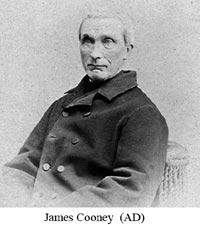Born: Dublin, Ireland, July 27, 1806.
Took the habit: Sicklinghall, July 14, 1853.
Vows: Sicklinghall, July 15, 1854 (No.593).
Died: Ottawa, Canada, December 4, 1881.
James Cooney was born in Dublin on July 27, 1806. According to the Personnel Registers of the General house, he began his novitiate in Maryvale on July 14, 1853 and took vows on July 15, 1854. These details are not very reliable, first of all because although the novitiate was in Sicklinghall in the period 1853-1854, the dates do not correspond with those from other sources. In the register of entries to the novitiate in England, the name James Cooney appears three times. There is a note written by Father Gustave Richard, novice master in Sicklinghall from 1853 to 1856 and dated August 30, 1853. Among the names is that of “Cooney, Jacques, received on May 19, 1853, born in Dublin on July 27, 1806. He was a tailor by trade. For a long time he was a schoolmaster and could possibly perform that duty if necessary. He had been several months in Maryvale. Quite a good character although he appears to be short-tempered and lively. He tends to seek solitude, is not at ease in gatherings. With his superiors he is very open, practices all the observances. He likes work. A good Brother.”
From this text and from the Registers of entry to novitiate it is obvious that the Brother had already done several months of novitiate in Maryvale in 1850. He did novitiate for the second time in 1853-1854 and, according to the Codex Historicus of Sicklinghall, he pronounced his vows for one year on May 20, 1854, and then made his perpetual vows on June 23, before leaving for Oregon. He was given the oblation number 370. Later, because of this number, his name was erased and the name of Brother Bouvier was substituted.
In the death note of Brother Cooney, Father Fabre says that he taught in Galveston College, Texas, in the period 1855-1858, but, according to Father Bernard Doyon he taught English in 1855-1856 (Cavalry of Christ on the Rio Grande, pp. 49 and 238). Did he leave at the beginning of 1856 and come back to England to begin novitiate once again on June 16, 1856? On that day, an entry in the Codex Historicus of Sicklinghall refers to “the investiture of Brother O’Brien and Brother Cooney.” It is nevertheless certain that was receptionist in Ottawa College from 1858 to 1881 apart from brief periods in 1858 and 1865-1867 when he taught school in Maniwaki.
We do not know what was the date of his perpetual vows. His name and the names of many of the Brothers who entered in the Canadian North and took perpetual vows before 1861, does not appear in the Personnel Registry. At the beginning of Father Fabre’s time as superior general, in 1862-1863, each one of these was allocated a number, Brother Cooney received number 593 but the dates 1853 and 1854 remained.
Brother Cooney died in Ottawa on December 4, 1881. His funeral was held in the church of Saint Joseph on the 6th,, with Antoine Pallier presiding. In the death notice, Father Fabre wrote as follows: “He was able to make himself esteemed and loved in a job which required great prudence, much politeness, patience and charity. He could have made friendships in the outside world; although gifted, he preferred, in his modesty, to be retiring and avoided coming to the forefront … From the religious point of view, he remained faithful to the essential observances of the Rule, and although he never seriously broke any of his vows, nor of the virtues which they require, we must admit that he left much to be desired in the matter of regularity. He tended to extend his rest periods too much, to become too immersed in newspapers and politics, to be absent from certain community exercises; these are the reprehensible imperfections, which are not always to be excused by failing health nor by the advancing years. The good religious makes an effort to persevere in these matters. It must be said, on Brother Cooney’s behalf, that he if he was not without reproach in these matters, he made up for his failings by a genuine piety and a great humility.”
Yvon Beaudoin, o.m.i.

